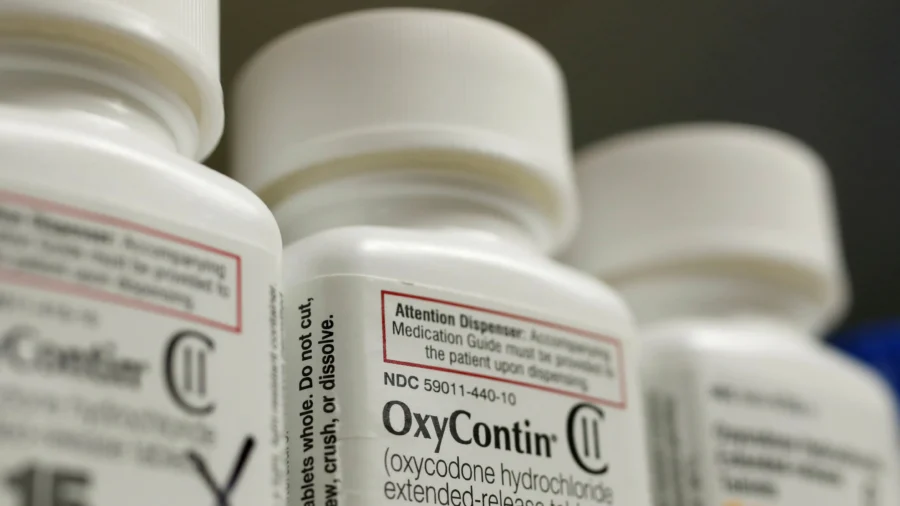Consulting firm McKinsey & Company has reached a $650 million settlement with the U.S. Department of Justice (DOJ) for its role in helping boost the sales of OxyContin, a highly addictive opioid, for Purdue Pharma, according to court documents filed in Virginia on Friday.
The agreement allows the firm to avoid criminal prosecution if it pays the sum and follows specific conditions for five years, including stopping all work related to the sale, marketing, or promotion of controlled drugs.
The settlement also includes an agreement from Martin Elling, a former McKinsey senior partner, to plead guilty to obstruction of justice for deleting documents from his laptop after he became aware of investigations into Purdue Pharma when it was a McKinsey client, the filings state.
The DOJ said that Elling, 60, a U.S. citizen currently residing in Bangkok, Thailand, is expected to appear in federal court in Abingdon, Virginia, to enter his plea and for sentencing at later dates. Court filings said Elling worked in various roles at McKinsey from 1993 to 2021, ultimately becoming a senior partner.
In response to the settlement, McKinsey expressed remorse for its involvement with Purdue Pharma in a statement to The Associated Press.
“We should have appreciated the harm opioids were causing in our society and we should not have undertaken sales and marketing work for Purdue Pharma,” the company said. “This terrible public health crisis and our past work for opioid manufacturers will always be a source of profound regret for our firm.”
Demanding Accountability
This settlement is part of a broader effort by federal prosecutors to hold companies accountable for their role in the U.S. addiction and overdose crisis, according to a press release by the DOJ, Office of Public Affairs on Friday.
“McKinsey schemed with Purdue Pharma to ‘turbocharge’ OxyContin sales during a raging opioid epidemic — an epidemic that continues to decimate families and communities across the nation. Today’s groundbreaking resolution makes clear our office’s commitment to holding powerful companies accountable for their part in the opioid epidemic, even if they did not make, sell, or dispense the drugs,” said U.S. Attorney Joshua Levy for the District of Massachusetts.
“Consulting firms like McKinsey should get the message: if the advice you give to companies in boardrooms and PowerPoint presentations aids and abets criminal activity, we will come after you and we will expose the truth.”
According to recent data from the Centers for Disease Control and Prevention, opioids have been linked to more than 80,000 annual deaths in some recent years, with illicit fentanyl being the primary cause in the past decade. Earlier in the epidemic, prescription pills were the primary cause of death.
In the last 15 years, McKinsey received more than $93 million from Purdue for work it performed, including strategies to improve OxyContin’s sales. Prosecutors allege that McKinsey knew of the risks associated with OxyContin and Purdue Pharma’s previous legal issues but chose to work with them nonetheless.
One of McKinsey’s tasks, according to the court filings, was allegedly to find prescribers who would generate the most additional prescriptions if targeted by Purdue salespeople. This resulted in prescriptions that “were not for a medically accepted indication, were unsafe, ineffective, and medically unnecessary, and that were often diverted for uses that lacked a legitimate medical purpose,” the filing alleged.
Christopher Kavanaugh, U.S. Attorney for the Western District of Virginia, said during a news conference in Boston there’s a real-world impact of McKinsey’s actions.
“This was not hypothetical,” he said. “This was not just marketing. It was a strategy. It was executed and it worked.”
According to the court filing, McKinsey consultants allegedly accompanied Purdue sales representatives on visits to prescribers and pharmacies in 2013 as part of an effort to “turbocharge” Purdue sales.
In 2014, McKinsey allegedly identified small clinics that were prescribing more opioids than entire hospital systems and suggested targeting them for increased sales, according to the court filing and the recent DOJ announcement.
The consulting firm also allegedly attempted to influence federal regulations to make high-dose OxyContin subject to the same oversight as lower-dose opioids and to make training for prescribers voluntary rather than mandatory, the government stated in its filings.
The recent federal settlement follows previous agreements by McKinsey to pay approximately $765 million to state and local governments and $78 million to health care funds and insurance companies for its role in the opioid crisis.
Purdue has faced other investigations on its operation, with three executives pleading guilty to misbranding charges in 2007 and the company itself pleading guilty to criminal charges in 2020, agreeing to $8.3 billion in penalties and forfeitures.
The Associated Press contributed to this report.

